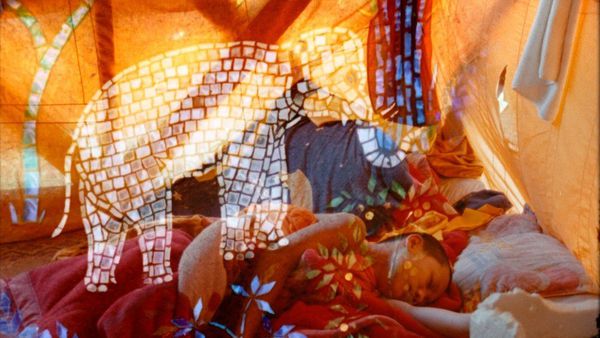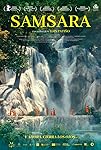Eye For Film >> Movies >> Samsara (2023) Film Review
Samsara
Reviewed by: Amber Wilkinson

In a world with so much streaming content on demand, it’s sometimes easy to forget about the unique experience of watching a film in a cinema, where every audience brings a different energy. While it could be argued that any film gains from that dynamic, there were several films from the past year for which it was particularly notable, including Oppenheimier, Society Of The Snow (ironically sent almost immediately to Netflix) and The Zone Of Interest. In among these big hitters, however, was another, equally innovative film that positively demands to be seen on a big screen where it can be best appreciated.
All of which is to say, don’t miss the opportunity to catch Samsara onscreen, a film that is special not least because you won’t actually be watching the screen itself when it’s at its most immersive. Lois Patiño proved he understood the capabilities of the big screen to transport the viewer with his debut Coast Of Death and following Red Moon Tide, he pushes the experience further with his third film. While attempting to describe the crux of Samsara is, essentially, as impossible as catching lightning in a jar, join me on a journey of imagination and we’ll give it a go.

The scene is set by the film’s first half, shot on tactile 16mm film marked by a turquoise infused palate with vibrant splashes of orange courtesy of the monks robes, which begins in a Buddhist temple in Laos at a meditation session. The camera drifts over a group of young men with their eyes closed, some more focused than others, as we become acutely aware of the rhythmic ambient sound in the background. This, though we don’t know it yet, is a reflection of what Patiño intends to recreate in the cinema at the midway point of his film.
This half of Samsara focuses on the last days of Mon (Simone Milavanh), an elderly woman who is preparing for her journey from her current life to the next with the help of young Amid (Amid Keomany) who is reading the Tibetan Book Of The Dead to her. At Mon’s bedside, there’s already a sense of otherworldly dreaminess thanks to the pink mosquito net over her bed, which makes her look gauzy, as though she’s already not quite a part of this world any more.
Soon, we’ll be invited to cross the “intermediate reality” of the Bardo with her before the second half of the film reveals her new life to us as a little goat called Neama, belonging to a young child in Zanzibar, where the camerwork of Jessica Sarah Rinland proves equally bequiling with light shining in and red the highlighted colour.
It is the Bardo where Samsara comes into its own and I urge you to follow the onscreen instructions and close your eyes, letting yourself become immersed in the interplay of light and sound that will take up the middle 15 minutes of the film as it plays out behind your eyelids. What crossing the Bardo will feel like precisely, I suspect will depend both on your own imagination and your willingness to give yourself up for it - if you do, it’s likely to be quite the trip.
Reviewed on: 09 Feb 2024

















